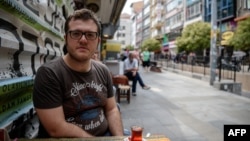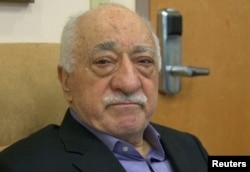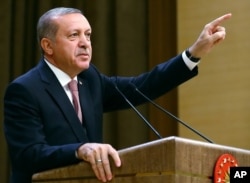With the summer holiday almost over, computer science student Hande Tekiner should be gearing up for a year of cram sessions and late-night homework. Instead, she may have nowhere to return to, because her university was shut after Turkey's failed coup.
Authorities have closed 15 universities and around 1,000 secondary schools linked to Fethullah Gulen, the Muslim cleric that they blame for the July 15 attempted putsch. Gulen, who has lived in Pennsylvania since 1999, has denied involvement in the plot and condemned it.
The closures have left about 200,000 students in Turkey in academic limbo, wondering if they can continue their studies and worried about the black mark of a Gulen school on their college record. Tens of thousands of academics and schoolteachers have also been purged, deepening concern about curtailment of academic freedom and free speech.
"As students at universities that have been shut, we are being victimized, even though those schools were opened with state approval," said Tekiner, 23.
She had been due to start her fourth and final year at Mevlana University in Konya before the coup. "I have doubts if I will be able to finish my studies," she said.
Tekiner said she and others were harassed on social media, labeled by anonymous accusers as supporters of the coup because they attended Gulen schools.
President Recep Tayyip Erdogan and the government say the cleric's network used the schools to recruit followers who then infiltrated the military, civil service and judiciary. Turkey has asked the United States to extradite him, but Washington says only a federal court can make that decision.
Since the coup, in which at least 240 people died, Turkey has detained about 40,000 people and formally arrested half of them. Rights groups and some in the West fear Erdogan is using the purges to stifle dissent and tighten his grip on power.
Pious masses
Until a public falling-out in 2013, Erdogan and Gulen were allies. Erdogan initially saw the cleric as useful in taming the influence of the military and secular elite who had dominated Turkey since the founding of the modern republic.
For years, Gulen's followers have run schools across Turkey and as far afield as Africa and the United States, blending Islam with an emphasis on science and interfaith dialogue. The schools helped to open up higher education to Erdogan's voter base — the pious masses often from poorer regions who were traditionally shut out of elite universities in Istanbul and Ankara.
Erdogan, himself a graduate of a religious school, has fought to bring religious education into the mainstream of constitutionally secular Turkey and worked to overturn a ban on the headscarf in parliament and universities.
But the closure of Gulen schools is troubling for students in towns where there are no other universities. Those from modest backgrounds — and female students from pious families — cannot afford, or may not be allowed, to live away from home.
"The reason I chose my university is to be close to home," said another student from Konya's Mevlana University. "As a girl, my family would never allow me to study in another town."
The Council of Higher Education, known as "YOK" in Turkish, provoked widespread outrage when it said students would be placed at new universities based on exam scores, meaning they could end up at a school on the other side of the country.
It later relented following a number social media campaigns, including one under the hashtag "#YOKbizimagduretme," or "YOK, don't victimize us."
Tens of thousands affected
Roughly 80,000 people in the military, civil service and judiciary have been sacked or suspended in the purges. Around half of those have been in education, according to state media.
Teachers unions and some opposition politicians say authorities are targeting educators based on evidence that is tenuous at best — such as having opened a savings account at Bank Asya, a now-defunct lender founded by Gulen's followers.
The government has said the investigations and other measures are necessary to prevent another coup.
But Kamuran Karaca, who heads one of Turkey's biggest teachers unions, said the wrong people were being targeted.
Since the coup, 88 members of his Egitim-Sen union have been suspended.
"All of our members who have been suspended, rather than being supporters of Gulen, are on the contrary people who strive for secular education and a secular life," said Karaca. "We believe they were blacklisted because they deposited their rent in Bank Asya, or took a loan from it, or a relative took a loan from it."
Gaye Usluer, a lawmaker from the opposition Republican People's Party, criticized what she said was a "sweeping" crackdown that has also harmed people who may be innocent.
Candan Badem, a Marxist historian, was briefly detained for possessing a book by Gulen in his home, his lawyer told Reuters. He was later released.
Badem signed an "Academics for Peace" petition this year that criticized military action in the largely Kurdish southeast. Erdogan denounced the more than 1,000 signatories, who included U.S. linguist and activist Noam Chomsky, and some Turkish academics were detained over it.
Defending the purge
Several academics and teachers declined to talk to Reuters about the purge, saying they were afraid to go on the record.
"The freedom to communicate and the freedom to collaborate are essential to functioning good science," said Rush Holt of the American Association for the Advancement of Science, who wrote an open letter to Erdogan urging protection of the rights of the scientific community.
The European University Association has said that measures introduced in the wake of coup "go in the wrong direction."
Still, some academics defend the crackdown.
"Nobody knows where this illegal organization starts and where it ends," said Sedat Gumus, an associate professor at Necmettin Erbakan University in central Konya. "In such a context, suspending many people from their jobs is understandable. In the investigation it will be revealed who was involved [and] to what extent. If there are people who are falsely accused, they should be able to return to their jobs."







